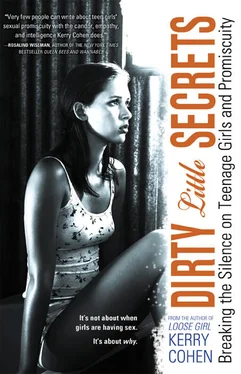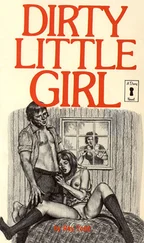Women’s desire does not always come before that of a man’s desire for her. We know, in fact, that women’s sexual desire is often dependent on being desired. In a New York Times Magazine article about female desire, the psychologist Marta Meana determined that “women’s desire is not relational, it’s narcissistic. It is dominated by the yearnings of ‘self-love,’ by the wish to be the object of erotic admiration and sexual need.” {27} 27 17. Marta Meana, quoted in Daniel Bergner, “What Do Women Want?” New York Times Magazine , January 22, 2009, www.nytimes.com/2009/01/25/magazine/25desire-t.html .
In other words, a women’s physical arousal is in direct relation to how much she is wanted—gazed at, one might say—by another. It is difficult to imagine how such desire is not at least somewhat culturally created, how it is at least partially, as Wolf suggests in her quote, tied up with a sense of permission—it is safe to be a desiring woman now that someone else has suggested I am acceptable.
Charlene is a good example of this. She grew up in a tough neighborhood. She watched her single mother scramble to pay the bills. Her father was long gone. She had one sister who was four years younger, so she didn’t feel like she had anyone she could relate to. The first time she felt a boy look at her with longing in his eyes, she knew it was something to pay attention to. She spent the greater part of her teens “boy hunting,” she said. She wanted to feel that she was desired, because at home she felt so completely undesired. When she felt sexual desire, she told me, it was entirely about that fantasy. If some hot guy with status wanted her, she got turned on and couldn’t help herself from having sex with him. The feeling, she said, was intoxicating, because those were the only times her body felt alive with desire, which made her feel alive, period.
These false beliefs—“I’m not good enough, pretty enough, thin enough, quiet enough…”—are one of the defining features of girlhood. For loose girls, sex and sexual attention become the answer to these beliefs. They possess the potential to make us good enough, pretty enough, lovable enough. This is why promiscuous behavior for a loose girl doesn’t end in adolescence. It often grows into an addiction of sorts. We try and try again to make the sex mean something about us. But ultimately it only harms us further.
Often, too, teenage girls’ experience of desire is subverted and redirected into narratives about male attention. This might be partially due to hormones, but certainly it’s also a result of cultural expectation. Genuine sexual desire is lost inside the power of getting that attention. The influence of this, the heady control of getting a boy or man to look our way, to desire us, is perhaps the easiest way for girls to feel any kind of influence when it comes to their sexuality. In a culture where girls’ genuine sexual desire is shrouded in silence, where there is no language of ownership for girls’ own sexual feelings, it is easy to see how girls gravitate toward this kind of power.
Like Faith at the swimming pool, a girl’s sexual maturity must be something of a paradox. Look, but don’t look. Touch, but don’t touch. In this way, being a girl is invariably tied up with need and negation, and with how a girl must negotiate those opposing forces.
For boys, it is entirely different.
Chapter 2
BOY CRAZY
The Fantasy Girls Have about Boys
Everywhere I turned there was a new one. I can remember my boyfriend coming to see me [at college] for the first time, and I came rushing up from another boy’s dorm room having just had sex, only to then have sex with him.
Kelsey was always jealous of boys. In grade school she wanted to be Batman or Spider-Man during recess, but she had to be Batgirl or the girl being saved. She developed early, with breasts in the fourth grade. Both boys and girls teased her regularly. They called her “Chesty” instead of Kelsey, and most who used to be her friends turned on her because they didn’t want to be associated with her. She cried often, which didn’t help, and she begged her mother to move to a different school district.
In fifth grade, she began to develop crushes on boys. They were all boys she knew she could never have, but still, she made up elaborate fantasies of them pulling her aside and telling her they secretly loved her. She imagined them kissing her, how their lips might feel on hers. And she imagined them offering to take her away from her life, to live just the two of them on an island where it didn’t matter if kids went to school.
And in sixth grade, when one of the cashiers at the Burger King down the street from her house suggested she meet him in the bathroom, she did so willingly, feeling that finally someone might want her. He lifted her shirt and kneaded her breasts, and then he told her to jerk him off. He didn’t kiss her once. He didn’t even ask her name, but he wore a name tag: Greg. She said she will never forget his name. He was her first sexual experience, her first understanding that boys could do something for her, something no one else could. Even though Greg never asked her into the bathroom again, even though she felt rejected and confused by what had happened, the experience set her on a search she is still stuck inside—a search for boys’ attention. She has since given blow jobs in stairwells at school, had sex in boys’ parents’ cars parked in driveways. She has had anal sex with a friend’s nineteen-year-old brother. None of them has tried to have a relationship with her. None has fallen in love with her. None of her fantasies about what boys can do for her—save her, release her, love her—has come true. But at sixteen she can’t seem to stop. At sixteen, boys still have the only solution Kelsey can see to her feelings of being undesirable.
Kelsey’s story is painstakingly familiar. I too spent much of my life believing a boy could save me from my pain. I too felt irrepressibly drawn to boys. I too couldn’t help myself. There was something about them. Sometimes, still, I can feel it: boy crazy. Other girls feel the same way. Here are some quotes about their own stories from some of the girls I interviewed:
“I felt like a shell of a person that only came alive when a boy or a man noticed me. I felt like the whole world revolved around being noticed and wanted by a boy or a man.”
“My experiences with boys feel like obsession, like there’s nothing more appealing in the world.”
“I get completely gaga over boys.”
“Without a boy in my life I feel like I don’t exist.”
“What is it about boys?”
Yes, what is it about them? This is the question that drives this chapter. My sense is that whatever “it” is, the groundwork begins young.
Lately, my three-year-old son has been playing make-believe. He wraps a cape around his small shoulders and builds a castle out of his oversized blocks and imagines stories for himself. In all the stories, there is someone he has to save, and in every scenario, I’ve noticed, that someone is a female. I have no idea where he has learned this narrative. I try steadfastly, albeit unsuccessfully, as his mother to prune out any books or television shows or movies that involve such a relationship between boys and girls. I work hard to speak of boys and girls as equals. But the narrative of a girl needing a boy to save her, and a boy coming along to do just that, is so insipid in our culture that it slipped into his very young consciousness without my knowing.
In truth, it is easy to see how it happened. In even the most innocuous movies—beginning with the ones meant for children—if a boy looks at a girl, if he finds her attractive in any way, it becomes clear quite quickly that he is in fact in love with her. Not only is he in love with her; he has eyes for no one else. And if he loved her as a child, when they grow up, they will be reunited, usually in some way that involves him rescuing her, and he will still be in love with her all those years later. And then add to this that so many images of girls—in these movies and elsewhere—show them overly concerned with what boys think of them.
Читать дальше












